Joe Lycett on bringing queer culture to Friday night live prime time: ‘It’s the stuff I’ve always wanted to do on telly’
Exclusive: Joe Lycett opens up on his new show, 'Davey Becks' and his love of queer culture.
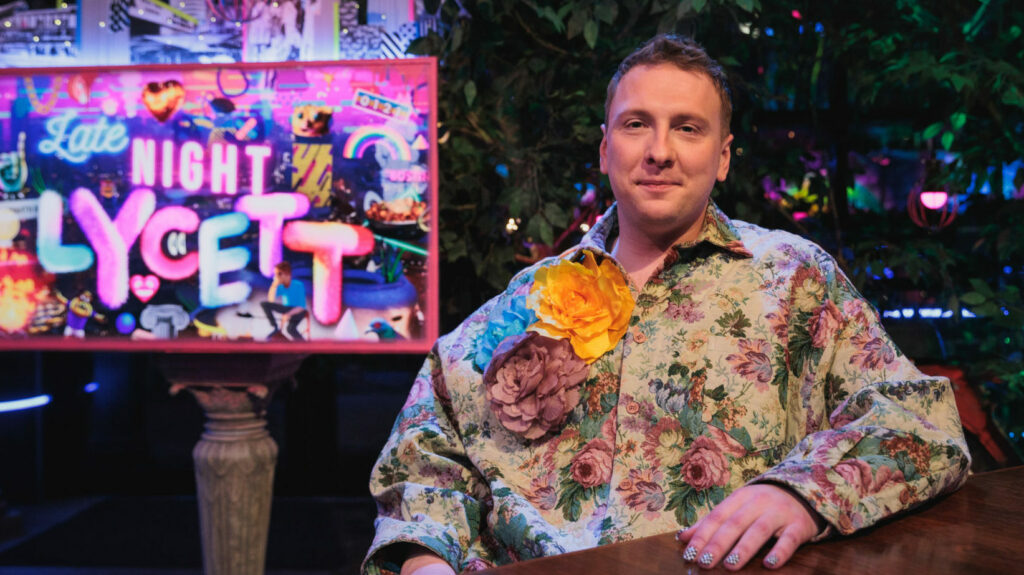
Joe Lycett is finally front and centre of your Friday nights with his gorge new show Late Night Lycett, and is loving every moment.
The comedian, tv presenter, painter, friend of Attitude, and much more admits he is actually “not obsessed with being on telly all the time” even though it might seem that way.
His new Late Night Lycett programme brings the chaos of live telly from his home city of Birmingham, complete with incredible guests, bonkers segments and drag queens galore.
So with its growing viewership and tonnes of love on social media, it seems mad to us that he nearly turned it down, as he shares in our chat.
“We’re still in the very early stages and there’s lots of things that could go wrong, and that we won’t get right” – Joe Lycett
Speaking over Zoom, we’re met with more than a couple of tech issues, mainly involving AirPods, but once we get into it, Joe opens up on everything from his new show, giving David Beckham’s team a “headache” and the “disgrace” of the EHRC’s newly-issued guidance relating to trans people.
Attitude: It feels Channel 4’s made a really big push for having more regional projects. Did you get approached to do this, or was this your idea?
Joe Lycett: Bit of both. Channel 4 came to me in lockdown and said: “We’d like to develop a Friday night show with you”. My agent said: “I think we should but you’re so busy. We should say thanks, but no thanks.” I said: “I’m inclined to agree with you, unless they want to commission this specific thing. I sent them a treatment for the show based on lots of stuff that I’ve always wanted to do in telly, and they were brave enough to do it. We were lucky that we got an on air pilot when we did the Pride show last year – that was a version of what we wanted to do and that went well.
Channel 4 were very happy with that. They’ve been really supportive and excited by it. I get a genuine sense from them that it’s the sort of telly they want to be making and is hopefully ticking a lot of the boxes that they want ticked. Their remit is to provide more regional TV, and to provide a voice for people that might not otherwise have voices. We’re very proud of the diversity we have on the show both in front of and behind the camera. It does a lot of things that Channel 4 want to do. We’re still in the very early stages and there’s lots of things that could go wrong, and that we won’t get right. Generally I’m very, very, very excited by it and really enjoying myself.
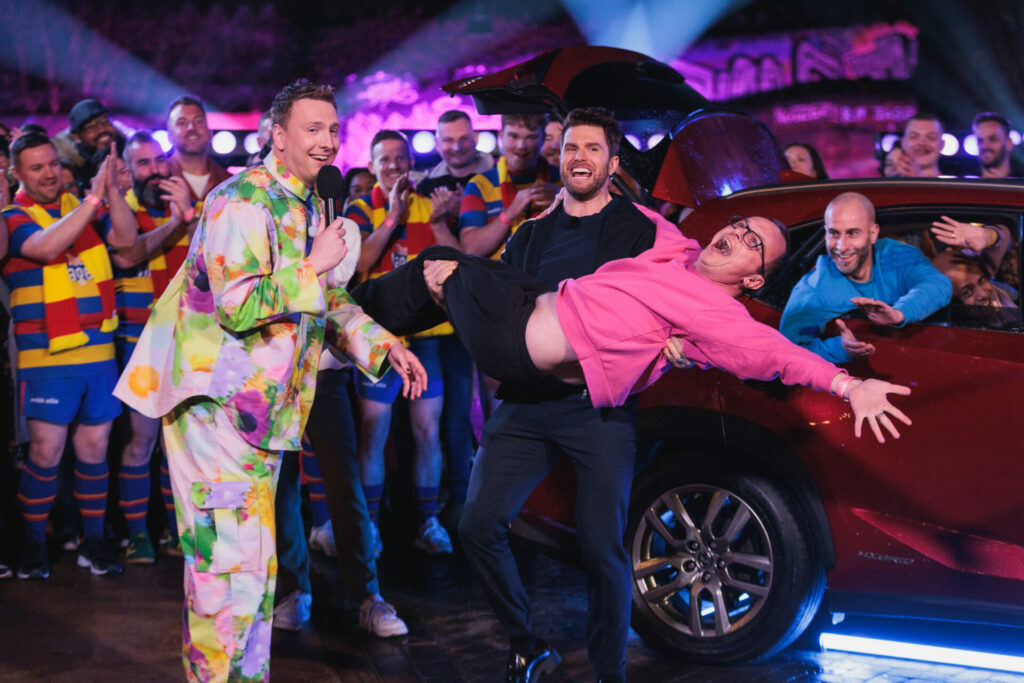
I feel like something that’s been missing in the last few years is that real buzz live TV brings. That feeling of, maybe something will go wrong, but that’s OK, and that’s almost part of why we’re here? Do you find that exciting?
Oh, massively. I love the live environment. I love doing live standup, that’s my bread and butter. That’s what I trained in, if you want to call it that. It’s all about live for me. It’s all about in the room, that feeling of the thing being exciting and electric. You want people to watch it and want to be there and you want them to be having a great time. I think we’ve started to capture that. We’ve managed to do the sort of thing that used to happen in 90s/00s shows, but with a modern twist, and in a way that involves queer culture, because I love it!
Yes! Hun culture, and queer culture are both massive parts of your show. How important was that to include for you? Obviously, you’ve got drag queens and kings. What’s it like to include that on primetime in such a big way that’s also so fun and chaotic?
I think the 90s and 2000s versions of this show were quite laddie-based. Lad culture was big, in the prevailing way… Oasis, having beers and all of that, were the vibe of those shows. I don’t think you’d get away with that in the same way now. We’ve moved on from that. For me, queer culture captures a lot of that kind of freedom and anarchy and having a go at stuff and finding stuff that’s a bit naff, funny and kitsch. There’s quite a crossover actually, with queer culture and that laddie 90s culture, but without the less feminist elements, the less inclusive elements.
Obviously, everything I do comes from a queer perspective, because I am queer, but it’s a very deliberate thing to be in that space. I love a late night drag bar, love a lot of that culture that LGBT+ people produce. House music came from an LGBT+ background. Leaning into that world and into diversity can only create interesting cultural things. It’s a deliberate choice, for sure.
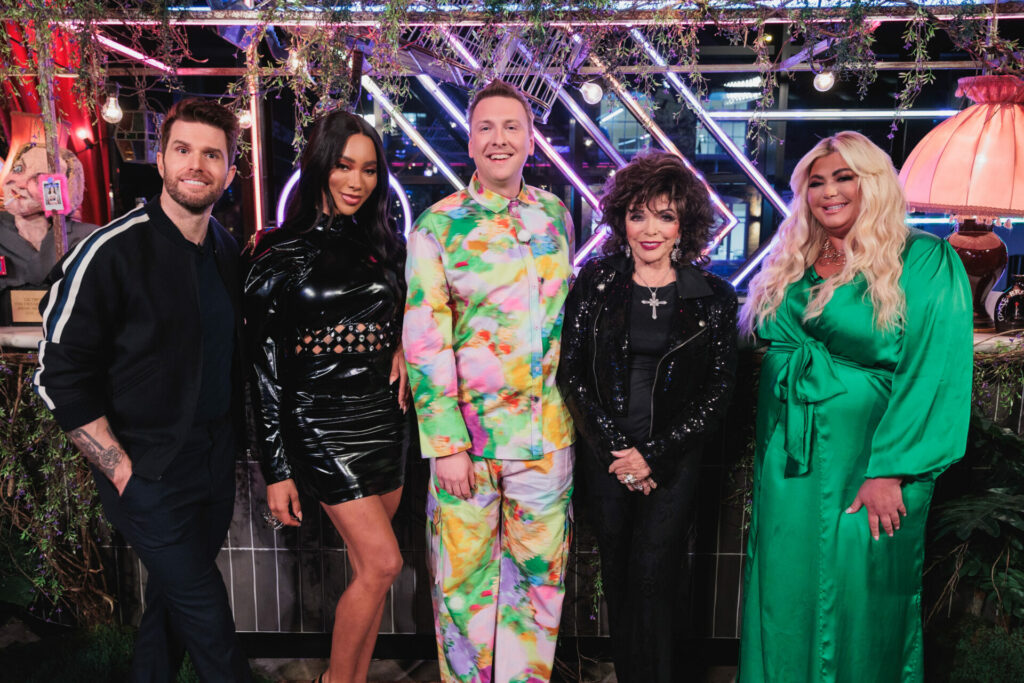
You’ve had some incredible guests so far. That moment with Joan Collins slapping Gemma Collins sums up hun culture for me. What’s it like having these incredible guests and being at helm of that chaos?
I can’t believe it really. I can’t believe that these people are coming to Birmingham for a start, and that they’re so up for it! Everyone’s really tuned into the show, when they’ve come on it and been part of it. Even Dame Joan Collins – I imagine her worlds don’t often collide with Anthea Turner running a corner shop – but we’ve done it! We want to be welcoming to our guests, but we’re bringing them into our world, not the other way around.
We want to be reverential to them to a point, but not at the expense of what we’re doing. It’s about booking people who are up for that. From what I can tell, everyone who’s been on the show has had a great time and really enjoyed it. One guest, who I won’t name, said that they loved it, but they felt almost overstimulated, which was a good word, I thought. I really liked that. We’re getting the balance, kind of right, we can definitely improve on that, but as a first series, I think we’re getting there.
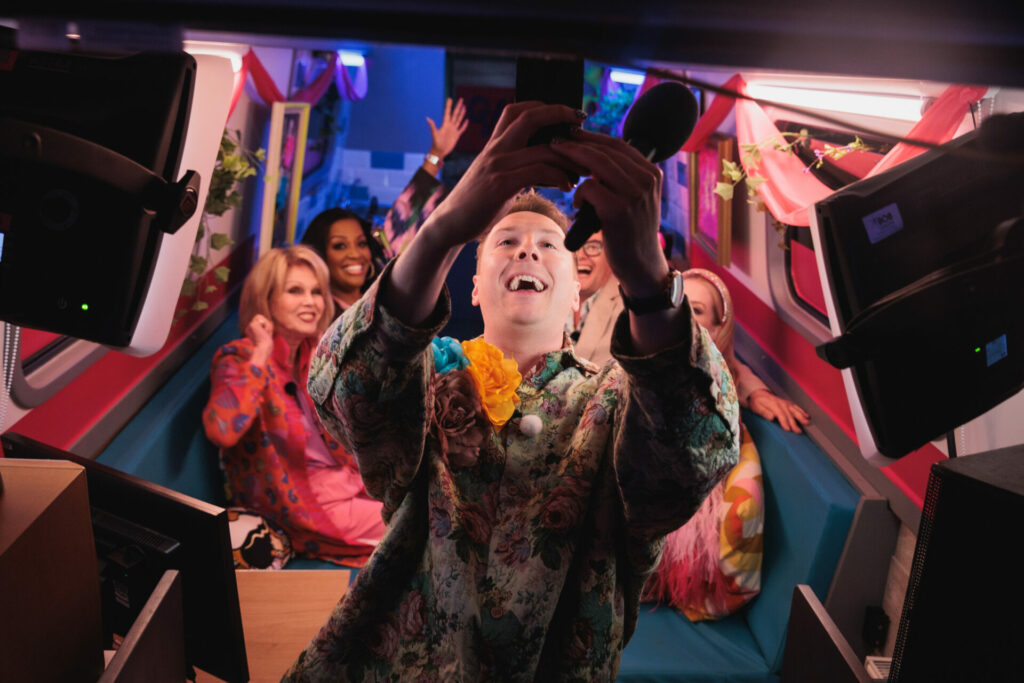
Of course, this is the first season, you’re trying out things, ironing out things. Have you spoken to C4 about whether there’ll be any more?
I haven’t spoken to them, because I know that they can’t answer the question yet – I don’t really understand the dark arts of commissioning and how they go about it. They have to consult audiences and do various tests and find out if they’ve got enough money and all of those things. I’m staying very much in my lane, trying to make the programme I want to make and as good a programme as possible, and leave it up to them to make those decisions. I obviously would love to do more, but if they come back and say we love it, but the queer thing isn’t working – not that they would ever say that – but do you know what I mean?
If I had big notes like that, I’d go: “Okay, fine. Thank you, but, bye bye.” I’ve had a really lovely career thus far and I’m not obsessed with being on telly all the time, believe it or not considering I’m on telly all the bloody time. I’m quite happy to kind of work on other things if the right thing isn’t there and I’m being spoiled at this point and I appreciate that, that doesn’t happen all the time. I’m very lucky to be able to make the show that I will be making in a minute, but I’m under no illusion that it will be there forever, because that would be daft. I think it will be around for however long it’s around. If it’s one series, we had a lovely series.
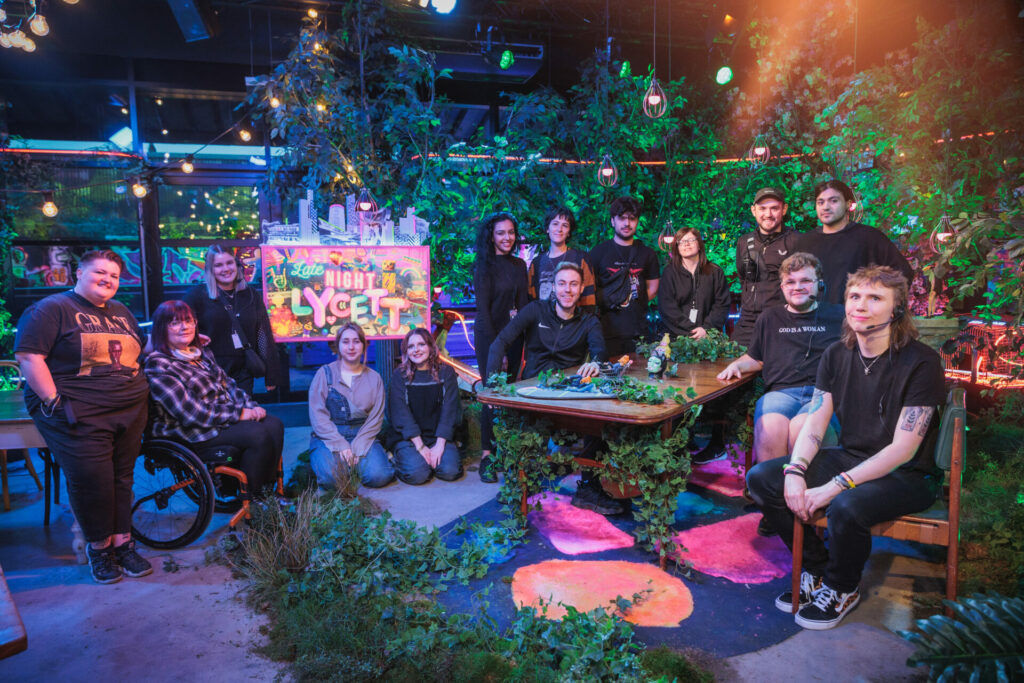
I wanted to ask about the trainees you’ve hired to work on your show. I think that’s such an incredible thing. It’s so hard to get into the industry. You originally were going to take four, and have managed to take on 26 – what’s that been like?
It’s been a joy of a process. We stole [the idea] from Guz Kahn, who did it on Man Like Mobeen. It’s something that I’ve been doing when I make short films separate to everything else. I use young people in Birmingham for those and found that they really helped with the crews, and the overall sense of wellbeing in the group. You get a fresh perspective on things and you lose some of that day to day mundaneness. Everything that you do suddenly, you’re going: “Oh, this person doesn’t know any of this and I can teach some of this.”
It’s been a really fulfilling experience. I think all the trainees are happy. You can’t predict and you can’t be across everyone but I met them all on a big Zoom at first when we’d just signed them all up and made sure that they were happy with everything and understood what the process was and that they were going to be mentored. I’ve met most of them over the weeks, some are only working a day here and there and whatever – they’re not all full time roles. What I’m so thrilled about is that there’s that sense of Birmingham having an opportunity to shine! It’s nice to be able to offer up those roles to people that probably wouldn’t get jobs in London for all sorts of reasons. I’m very proud of it and I’m very glad that the show has been able to facilitate it.
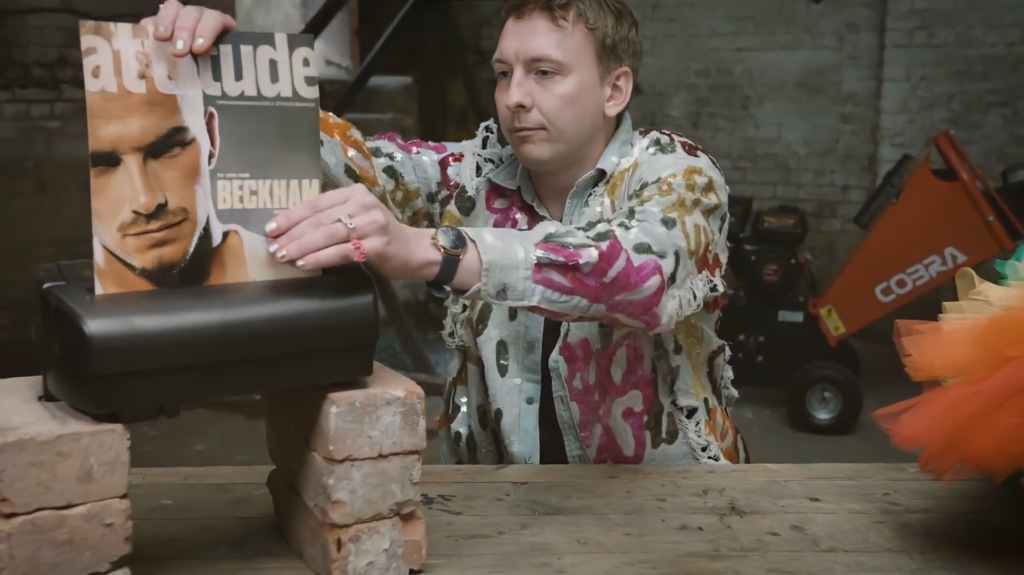
I have to ask about… David Beckham. It was a very big thing for us too, as you shredded the cover of Attitude with him on. Has anything happened since? The money you donated to charities – have you heard what they’ve done with it?
I haven’t actually, that’s a good question, I should go back and find out what they’ve done with it. Haven’t heard any more from Davey Becks or his team. But I did hear from someone that went for, I think a dinner, sat next to his manager, or someone in his management team, and they did say that it was a bit of a headache for them. Which doesn’t surprise me. I feel like I’ve made my point.
I don’t have a grudge against David Beckham. I’m not going to continue talking about him and doing extra stuff. I’ve made a point about him and I’m happy to draw a line under it really. Obviously, I would like things to be better, but I don’t have an axe to grind against him. It was a very specific thing that we did. I’ve got sort of nothing to add, really. I’ve moved on in terms of stories we want to look at and the things that we want to tackle. It felt like an opportunity. There was so many eyes on Qatar and so much talk about the World Cup, and human rights issues there.
It felt like an opportunity to raise awareness for LGBT+ people in Qatar. You do have to pick your battles, because there’s so many stories that you could be talking about. There’s so much injustice, particularly in the LGBT+ world.
I was going to ask what you have planned next. Something that’s come up is politicians in this country not supporting trans rights, especially around new EHRC guidance. Some Labour figures aren’t actively supporting trans rights. How do you feel about that? Would you ever want to talk to Keir Starmer about it?
I’d like to talk to anyone that’s going to be potentially going to be in power, or is in power. When I did Laura Kuenssberg’s show I was desperate to go and speak to Liz Truss off camera. [Production] were like: “No, no, we’ll just move you to this other room”. I’m definitely up for talking to any of these people about it. In terms of trans rights, I am probably not the person best placed to discuss that with someone like Keir Starmer. If there was that opportunity, I’d like to take along with me someone who is well versed and read about it. Someone like Munroe, who was on the show, Munroe Bergdorf, or Shon Fay. They’ve written about all this.
I do think what’s happening to trans rights, particularly this potential ruling of the EHRC is a disgrace, really. I truly don’t believe that trans rights and women’s rights are things that can’t live alongside one another. It’s not one or the other. These two things can live and actually do live next to each other as bedfellows from a point of intersectionality. We’re all essentially striving for the same thing. It’s just we don’t always see eye to eye on the details. I really hope we can find a way forward. My trans friends in the UK at the minute are thinking of leaving, essentially. New Zealand took a trans person from the UK as an asylum seeker, essentially because it was deemed unsafe for them to be in this country, by the New Zealand government, and gave them asylum.
When that’s happening, you think: “This isn’t right. We’re a modern progressive country, we should be looking after the vulnerable groups. The massive problem with it is, essentially, the right wing media. I said to a trans friend of mine I’ve known for 15 years: “Is it harder now? Because I feel like when we first met, there wasn’t this heat and noise”. She said: “You would think that, but actually, for all the people that are against us, we now have loads of people who are for us”. That makes things easier for her.
When there were people against her back in the day, she was just on our own. Now there’s a real support network there. I think things are getting better. It’s got heated in a way that maybe was an inevitable thing, but I really hope it doesn’t continue. Because ultimately vulnerable people get hurt when that happens.
I think you’ve summed that up so well. It’s such a scary time for a lot of people at the moment.
It’s also confusing and I get why some people don’t fully understand. I don’t fully understand all the details around it. I’ve done a lot of reading around it, I’m very confident in my position in it as a result of that. But I don’t think it’s all going to be simple or easy but none of these things ever are. I hope we don’t go backwards and that’s what the EHRC thing feels like to me. It doesn’t feel well thought out really.
Late Night Lycett Is on Channel 4 at 10pm on Friday.
